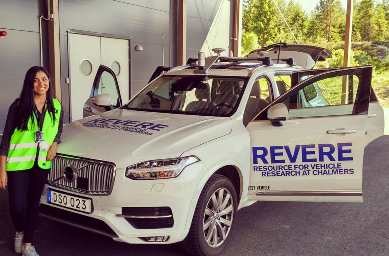SALI Project accepted!
Jul 30, 2018
Project accepted into the OpenResearch@AstaZero Program!. The SALI project aims at providing an open software engineering solution to integrate self-* capabilities such self-healing, self-optimization and self-improvement to self-driving vehicles for responding to runtime challenging factors such as unpredictability, faults and limited resources. Edith Zavala, member of the GESSI research group, is one of the project leaders, jointly with Dr. Christian Berger of the University of Gothenburg.
Purpose and goals
The SALI project aims at implementing and testing an open software engineering solution to integrate self-* capabilities such self-healing, self-optimization and self-improvement to self-driving vehicles for responding to runtime challenging factors such as unpredictability, faults and limited resources.
Moreover, it aims at documenting the ongoing collaboration between the vehicle laboratory “Chalmers Revere” (Sweden) and the university “Universitat Politècnica de Catalunya” (Spain).
Results and effects
The SALI project will provide advancements in the research areas of autonomous vehicles and software engineering. The major novel contribution will be in exploiting thousands of heterogeneous runtime data such sensor data and v2x communications, for providing smarter self-* capabilities to self-driving vehicles. The results of this project will be published in the form of scientific contributions (e.g., an article in an indexed journal), making them available to the great research community interested on this topic.
Test design and procedure
The implementation of the SALI project solution will be performed in the context of the “Chalmers Revere” laboratory. That is, we will use the resources offered by the laboratory, for designing, developing and testing software solutions for automotive systems, in order to develop the SALI project solution.
Concr etely, we will use the OpenDLV framework for building a software solution to be tested in a simulation, miniature vehicles and finally the AstaZero environment.
etely, we will use the OpenDLV framework for building a software solution to be tested in a simulation, miniature vehicles and finally the AstaZero environment.
The three main runtime challenging factors that affect self-driving vehicles and that motivate the SALI project are: unpredictability, faults and limited resources. Thus, we have designed three main use cases for testing our solution, one per runtime factor. The first use case (uc1) consists on testing the ability of SALI self-driving vehicles to respond to an unpredictable event such witnessing a road accident e.g., a crash. The second use case (uc2) tests the ability of SALI self-driving vehicles to respond to (indispensable and not) sensors failures. Finally, the third use case (uc3) focuses on testing how SALI selfdriving vehicles manage their resources for satisfying requirements and constraints, e.g., limited battery in electric vehicles.

Share: